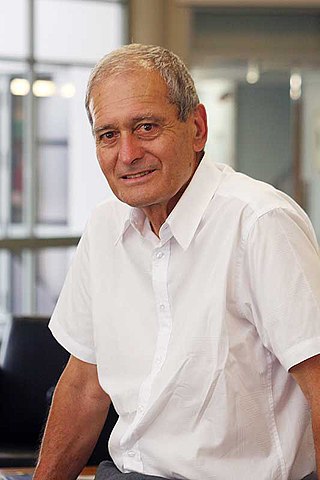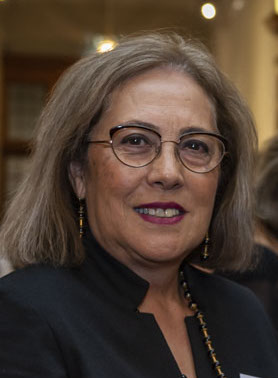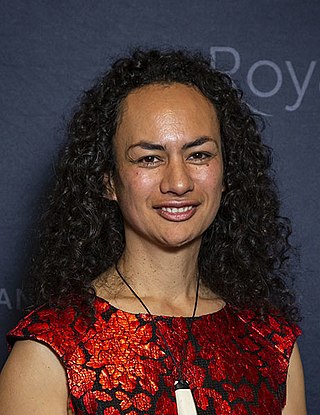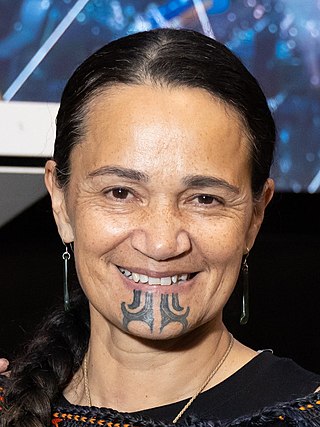Related Research Articles
Beta cells (β-cells) are a type of cell found in pancreatic islets that synthesize and secrete insulin and amylin. Beta cells make up 50–70% of the cells in human islets. In patients with Type 1 diabetes, beta-cell mass and function are diminished, leading to insufficient insulin secretion and hyperglycemia.

Amylin, or islet amyloid polypeptide (IAPP), is a 37-residue peptide hormone. It is co-secreted with insulin from the pancreatic β-cells in the ratio of approximately 100:1 (insulin:amylin). Amylin plays a role in glycemic regulation by slowing gastric emptying and promoting satiety, thereby preventing post-prandial spikes in blood glucose levels.
David Vernon Williams is a professor, and former deputy dean of the University of Auckland's Faculty of Law. He comes from the Hawke's Bay region of New Zealand, and was educated at Wanganui Collegiate School.

Sir Mason Harold Durie is a New Zealand professor of Māori Studies and research academic at Massey University. He is known for his contributions to Māori health. In 2020, he was appointed to the Order of New Zealand, the highest honour in New Zealand's royal honours system.

Linda Tuhiwai Te Rina Smith was a professor of indigenous education at the University of Waikato in Hamilton, New Zealand and is now Distinguished Professor at Te Whare Wānanga o Awanuiārangi. The daughter of Sidney Moko Mead, she affiliates to the Ngāti Awa and Ngāti Porou iwi.

Dame Margaret Anne Brimble is a New Zealand chemist. Her research has included investigations of shellfish toxins and means to treat brain injuries.

Ocean Ripeka Mercier is a New Zealand academic specialising in physics and Māori science.

Siouxsie Wiles is a British microbiologist and science communicator. Her specialist areas are infectious diseases and bioluminescence. She is based in New Zealand.

Linda Waimarie Nikora is a New Zealand psychology academic. She is Māori, of Te Aitanga a Hauiti and Ngāi Tūhoe descent. She is currently Professor of Indigenous Studies and co-director of Ngā Pae o te Māramatanga at the University of Auckland, having moved in 2017 from the University of Waikato where she had been a Professor of Psychology and the founding Director of the Maori & Psychology Research Unit in the School of Psychology.
Elizabeth Mary Rata is a New Zealand academic who is a sociologist of education and a professor in the School of Critical Studies in Education at the University of Auckland. Her views and research on Māori education and the place of indigenous knowledge in the New Zealand education system have received criticism from other academics.
Deborah Lucy Hay is a New Zealand academic. In 2022 she was elected a Fellow of the Royal Society Te Apārangi.
Nicola Dalbeth is a New Zealand academic rheumatologist whose research focuses on understanding the impact and mechanisms of gout. She supports clinical and laboratory research programmes and holds dual appointments as a full professor at the University of Auckland and as a consultant for the Auckland District Health Board.
Jacqueline Rae Beggs, is a New Zealand entomologist and ecologist of Ngāti Awa descent, specialising in biodiversity and biosecurity, specifically in regard to managing the impact of invasive invertebrates on the biosystem. She has also researched the identification of drivers of pollination and evaluated the use of the molecular approach to identify possible causes of detrimental changes in the environment. Beggs is associated with organisations focused on raising awareness of a wide range of issues relevant to biosecurity and advises New Zealand government agencies. She has written on the value of recognising the importance of matauranga Māori in ecological research. Beggs is a professor at the University of Auckland.
Matire Louise Ngarongoa Harwood is a New Zealand clinical researcher and trainee general practitioner.She is an associate professor at the University of Auckland. Harwood was the 2017 New Zealand L'Oréal UNESCO For Women in Science Fellow. Her expertise is in Māori health, focussed on reducing health inequity by improving indigenous health and well-being.

Shaun Cameron Hendy is a New Zealand physicist. He is currently a professor at the University of Auckland and was the first director of Te Pūnaha Matatini, a centre of research excellence in complex systems and data analytics. During the COVID-19 pandemic in New Zealand, he led a team of scientists developing mathematical models of the spread of the virus across the country that influenced the government's response to the outbreak.
Robert Nola was a New Zealand philosophy academic, and was an Emeritus Professor in the Department of Philosophy at the University of Auckland. His work focussed on the philosophy and history of science, on epistemology and on metaphysics.

Waikaremoana Waitoki, also known as Moana Waitoki, is a New Zealand clinical psychologist, academic, and former president of the New Zealand Psychological Society from 2020 until 2022. She is a senior lecturer at the University of Waikato, and focuses her research on indigenous psychology, Mātauranga Māori and cultural competency.
The New Zealand Free Speech Union (FSU) is an organisation that advocates for freedom of speech. It was formed as the Free Speech Coalition in 2018 and relaunched as the Free Speech Union in 2021.
In July 2021, in the context of a review of the secondary school curriculum National Certificate of Educational Achievement (NCEA), seven University of Auckland professors and emeriti professors published a letter "In Defence of Science" in the current affairs magazine New Zealand Listener, which generated considerable controversy for claiming indigenous knowledge "falls far short of what can be defined as science itself."
Tara G McAllister is a New Zealand freshwater ecology academic and is associated with Te Pūnaha Matatini at the University of Auckland. She is a Māori of Te Aitanga ā Māhaki and Ngāti Porou descent.
References
- 1 2 3 "Professor Garth James Smith Cooper". University of Auckland. Retrieved 28 November 2021.
- 1 2 3 4 Adams, Graham (23 November 2021). "Māori professor under investigation for views on mātauranga Māori". New Zealand Centre for Political Research. Retrieved 28 November 2021.
- 1 2 3 4 "Prof Garth JS Cooper DPhil (Oxon), DSc (Oxon), FRCPA, FRSNZ, FMedSci". University of Manchester . Retrieved 28 November 2021.
- ↑ "Prestigious honour for New Zealand medical researcher". Maurice Wilkins Centre for Molecular Biodiscovery. 15 May 2013. Retrieved 28 November 2021.
- ↑ "Professor Garth Cooper conferred Doctorate in Science by Oxford". Maurice Wilkins Centre for Molecular Biodiscovery. 12 September 2017. Retrieved 28 November 2021.
- ↑ Du Fresne, Karl (5 December 2021). "Free speech under attack?". Gisborne Herald . Archived from the original on 5 December 2021. Retrieved 13 January 2022.
- ↑ Sachdeva, Sam (18 November 2021). "Royal Society investigation into mātauranga Māori letter sparks academic debate". Newsroom . Archived from the original on 17 November 2021. Retrieved 13 January 2022.